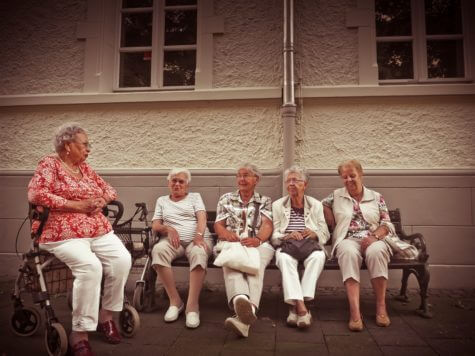CHICAGO — Joining the weekly bridge game in your elder years may be more beneficial than you thought. A new study finds that people who maintain close friendships during old age have a stronger memory and show slower cognitive decline than those who live quieter, less social lives.
Researchers at Northwestern University surveyed 31 “SuperAgers” — people who are at least 80 years old yet have the cognitive prowess of people aged 50 to 65 — along with 19 people over 80 who were deemed cognitively average.

Participants completed a 42-item questionnaire used to determine their psychological well-being. The survey measured the individuals on six areas: Environmental Mastery, Personal Growth, Positive Relations with Others, Self-Acceptance, Autonomy, and Purpose in Life.
The authors discovered one noticeable difference between the two groups of participants: the SuperAgers scored significantly higher when it came to measuring positive relations with others. They reported having more “satisfying, high-quality relationships” than their average counterparts.
“This finding is particularly exciting as a step toward understanding what factors underlie the preservation of cognitive ability in advanced age, particularly those that may be modifiable,” explains first author Amanda Cook, a clinical neuropsychology doctoral student, in a university news release.
The study is the first to look at how social networks play a role in SuperAgers’ incredible abilities. Senior author Emily Rogalski, an associate professor at Northwestern’s Cognitive Neurology and Alzheimer’s Disease Center, says seniors don’t necessarily need to turn into social butterflies in order to be a SuperAger.
“You don’t have the be the life of the party, but this study supports the theory that maintaining strong social networks seems to be linked to slower cognitive decline,” she says.
Prior research supports the findings. A study earlier this year found that friendships may actually be more important to a person’s well-being during old age than family. A 2006 study showed that social engagement during old age was also linked to a sharper brain, while a 2014 study found it can help prevent cognitive decline.
A strong social network can also help protect seniors from developing dementia, a 2010 study found.
That said, the researchers note that having a strong brain requires more than just a few buddies. How you take care of your body also plays an important role, of course.
“It’s not as simple as saying if you have a strong social network, you’ll never get Alzheimer’s disease,” says Rogalski. “But if there is a list of healthy choices one can make, such as eating a certain diet and not smoking, maintaining strong social networks may be an important one on that list. None of these things by themself guarantees you don’t get the disease, but they may still have health benefits.”
The latest research from Northwestern was published Oct. 23 in the journal PLOS One.

Comments
Comments are closed.